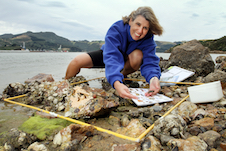 Director, New Zealand Marine Studies Centre
Director, New Zealand Marine Studies Centre
Contact
Office NZ Marine Studies Centre, 85 Hatchery Road, Portobello
Tel +64 3 479 5842
Mob +64 21 279 5842
Email sally.carson@otago.ac.nz
Academic qualifications
BSc Mount Allison University
MSc University of Alberta
PhD (in progress) University of Otago
Links
- Sally Carson profile (Curious Minds website)
- New Zealand Marine Studies Centre website
- Marine Metre Squared website
New Zealand Marine Studies Centre Annual Reports
- 2019 NZ Marine Studies Centre Annual Report (PDF)
- 2018 NZ Marine Studies Centre Annual Report (PDF)
- 2017 NZ Marine Studies Centre Annual Report (PDF)
Research interests
Sally is a member of the Coastal People: Southern Skies collaboration that connects communities with world-leading, cross-discipline research to rebuild coastal ecosystems.
Coastal People: Southern Skies
Her interests include:
- Citizen science
- Community engagement in science
- Informal science education
- Intertidal ecology
Projects
Marine Science Education for Southern NZ Schools
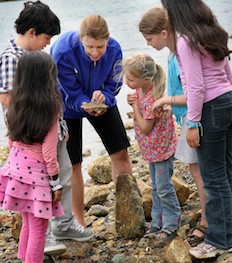 The NZMSC education programmes, based in Dunedin and Nelson, use the marine context to champion science learning for both students and teachers across southern NZ. An authentic science learning environment where students work in a laboratory setting with microscopes and other scientific equipment and have access to the seashore, live animals and science specialists are key elements in a successful programme.
The NZMSC education programmes, based in Dunedin and Nelson, use the marine context to champion science learning for both students and teachers across southern NZ. An authentic science learning environment where students work in a laboratory setting with microscopes and other scientific equipment and have access to the seashore, live animals and science specialists are key elements in a successful programme.
Our programmes link to the NZ Curriculum and focus on the Nature of Science strand, support achievement for a diversity of students including Māori and Pasifika and are tailored to meet specific learning outcomes.
Research focuses on the outcomes for both students and teachers. Case studies have shown how the programmes can be adapted for other science institutions (eg partnership with Cawthron Institute in Nelson and NZMSC).
Project supported by Ministry of Education LEOTC contract (1998-2021)
Science Extension and Enrichment Programmes in Marine Science
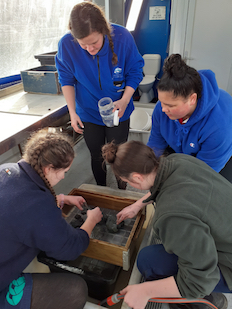 The New Zealand Marine Studies Centre (NZMSC) has developed programmes for gifted students from southern NZ secondary and upper primary / intermediate schools to engage in a science research programme based at the Portobello Marine Laboratory (University of Otago). A series of multiday / residential marine science programmes, aimed at different levels, will provide an authentic research context, a unique learning environment (laboratory, research vessel), a range of learning experiences and opportunities to engage with experts to extend and challenge gifted learners.
The New Zealand Marine Studies Centre (NZMSC) has developed programmes for gifted students from southern NZ secondary and upper primary / intermediate schools to engage in a science research programme based at the Portobello Marine Laboratory (University of Otago). A series of multiday / residential marine science programmes, aimed at different levels, will provide an authentic research context, a unique learning environment (laboratory, research vessel), a range of learning experiences and opportunities to engage with experts to extend and challenge gifted learners.
These programmes support student's knowledge building and shared learning through multidisciplinary connections and challenges. Research is focused on both student outcomes for post-graduate research students who mentor the school students to carry out in-depth practical inquiry.
Project supported by Ministry of Education Opportunities and Events for Gifted Learners (2019-2020)
Marine Metre Squared Citizen Science Project
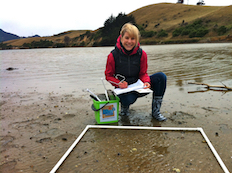 The Marine Metre Squared project is encouraging communities to get involved in long term monitoring of the marine environment. The development of protocols and collection of data over time allow communities to assess change of their local shoreline and supports stewardship and restoration projects. This nation-wide Citizen Science initiative helps build a picture of the biodiversity, distribution and abundance of seashore animals and plants in New Zealand's marine environment.
The Marine Metre Squared project is encouraging communities to get involved in long term monitoring of the marine environment. The development of protocols and collection of data over time allow communities to assess change of their local shoreline and supports stewardship and restoration projects. This nation-wide Citizen Science initiative helps build a picture of the biodiversity, distribution and abundance of seashore animals and plants in New Zealand's marine environment.
The project enables students, families, community groups and iwi to participate and contribute to a meaningful, future-focused, environmental study that encourages ecological sustainability and community engagement at both a local and national level. Case studies highlight how the project has been used to address local issues (eg impact of dredging in Otago Harbour), contribute to long term data collection and habitat assessment (eg monitoring of Marine Reserves) and address the issue of data quality.
Project supported by:
MfE Community Environment Fund (2012-15)
DOC Community Conservation Partnership Fund (2016-19)
Otago Participatory Science Platform (2016-17)
Aquavan, Developing our coastal connections
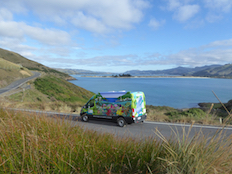 This project is focused on creating awareness and understanding of the connectivity between river health and the coastal environment, in a dynamic and hands-on way with both schools and the wider community. The Aquavan, a vehicle with a recirculating seawater system and live marine species, is an educational tool to spark interest, develop connections with the sea and expand Southern New Zealanders' view of their 'local' environment.
This project is focused on creating awareness and understanding of the connectivity between river health and the coastal environment, in a dynamic and hands-on way with both schools and the wider community. The Aquavan, a vehicle with a recirculating seawater system and live marine species, is an educational tool to spark interest, develop connections with the sea and expand Southern New Zealanders' view of their 'local' environment.
Travelling up catchments, the Aquavan engages with communities and schools to raises awareness of local environmental issues, develop networks, share good practice and develop knowledge and skills for action. Questions around the effectiveness of tools and resources for environmental monitoring and knowledge mapping, including estuary studies / data analysis with Marine Metre Squared, and methods to share scientific information and document environmental change through the use of interactive maps, narratives, multimedia and infographics with arcGIS StoryMap are being investigated.
Marine Metre Squared website
arcGIS StoryMap website
Project supported by MBIE Unlocking Curious Minds (2018-19)
Fishy Web Cam, Linking the southern ocean with the community
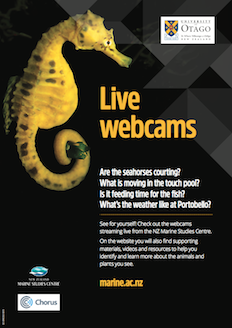 The Fishy Web Cam is the first of its kind in New Zealand to be live streaming the underwater world. Days in the life of Otago Harbour and southern NZ coastal waters are beamed into classrooms and living rooms, via cameras installed in the NZMSC's tanks, off the jetty, and in the labs. This smart technology provides a easy-to-access window into the sea to highlight the diversity and behaviour of marine wildlife to a wide audience.
The Fishy Web Cam is the first of its kind in New Zealand to be live streaming the underwater world. Days in the life of Otago Harbour and southern NZ coastal waters are beamed into classrooms and living rooms, via cameras installed in the NZMSC's tanks, off the jetty, and in the labs. This smart technology provides a easy-to-access window into the sea to highlight the diversity and behaviour of marine wildlife to a wide audience.
The project also provides a new set up for marine investigations and research. Data collection of real time environmental variables, alongside the web cameras, provide opportunities to investigate changes and responses in biotic assemblages, over short and longer-term time scales. A variety of educational resources have been developed to support the use of the web cams in the classroom. How this live stream is being utilized by schools and the effectiveness of the platform as a teaching resources are key questions to be investigated.
Project supported by Chorus and the Digital Community Trust (2018-19)
Shark Spy Citizen Science Project
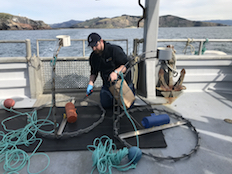 The main objective of this project is to explore the abundance and demographics of shark populations local to the Otago region. There is currently a paucity of data pertaining to shark species that inhabit coastal ecosystems around New Zealand. The Otago region has a rich marine diversity and previous research has indicated that numerous species of shark frequent the coastal waters around Dunedin.
The main objective of this project is to explore the abundance and demographics of shark populations local to the Otago region. There is currently a paucity of data pertaining to shark species that inhabit coastal ecosystems around New Zealand. The Otago region has a rich marine diversity and previous research has indicated that numerous species of shark frequent the coastal waters around Dunedin.
Schools and the wider community can help monitoring sharks along the Otago Coastline with Shark Spy to collect valuable information about species diversity and seasonal abundance of sharks and their prey species. Students will help set aited remote underwater videos (BRUVs) at set locations around the Otago coastline and analyse the data collected. A photo system for reporting opportunistic encounters of sharks by the wider community (divers, surfers, fishers, boat users, etc.) will provide incidental occurrence data. Lastly, conducting surveys for shark egg cases on local beaches around the region will provide information about seasonality of reproductive behaviour for some species.
Project supported by Otago Participatory Science Platform (MBIE)
Hoea te Waka, Piki te Mātau
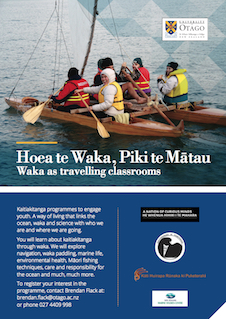 Through waka as traveling classrooms this project is engaged youth and develop their science skills, grow their understanding of environmental process, and built capacity for sustainable ocean management.
Through waka as traveling classrooms this project is engaged youth and develop their science skills, grow their understanding of environmental process, and built capacity for sustainable ocean management.
The project included:
- Consultation with youth, waka leaders and Kaitiaki / Tangata Tiaki
- Development of a series of environmental science activities in combination with a waka experience
- Working with community leaders to deliver the programmes
- Evaluation of how the project grew youth awareness of the environment, of themselves and their cultural connectedness
Working alongside communities and cultural leaders, provided an experience where youth develops positive attitudes and values for coastal stewardship and sustainable marine management for future generations. Supporting educational resources were developed.
Project supported by MBIE Unlocking Curious Minds (2015 - 16)
Postgraduate students
Smith, A. 2019. Assessing citizen science in the marine environment. MSc Thesis
Publications
Carson, S., & Rock, J. (2023). How do New Zealand marine scientists perceive the benefits and limitations of citizen science? New Zealand Science Review, 79, 1-16. Journal - Research Article
Carson, S., & Morris, R. (2022). The New Zealand seashore guide. Nelson, New Zealand: Potton & Burton, 416p. Authored Book - Research
Cole, C., Savoie, G., & Carson, S. (2022). Our ocean climate story: Connecting communities with local data [Practice insight]. Journal of Science Communication, 21(6), N02. doi: 10.22323/2.21060802 Journal - Research Other
Lalas, C., Carson, S., & Perriman, L. (2022). Continued increase in red-billed gulls (Larus novaehollandiae scopulinus) at Otago, southern New Zealand: Implications for their conservation status and the importance of citizen science. Notornis, 69, 81-88. Retrieved from https://www.birdsnz.org.nz/publications/continued-increase-in-red-billed-gulls-larus-novaehollandiae-scopulinus-at-otago-southern-new-zealand-implications-for-their-conservation-status-and-the-importance-of-citizen-science/ Journal - Research Article
Carson, S., Rock, J., & Smith, J. (2021). Sediments and seashores: A case study of local citizen science contributing to student learning and environmental citizenship. Frontiers in Education, 6, 674883. doi: 10.3389/feduc.2021.674883 Journal - Research Article